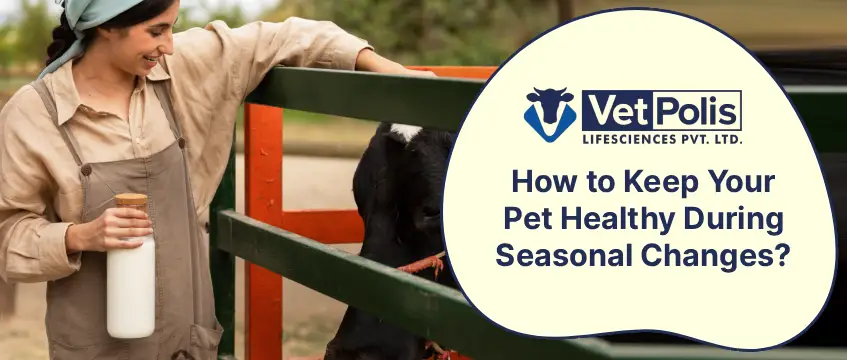How to Keep Your Pet Healthy During Seasonal Changes?

Pets, just like humans, are responsive to the environment around them. Their health may be influenced by temperature and humidity. Seasonal changes usually have their special problems, such as winter colds and heat exhaustion in the summer, spring allergies and diseases in the monsoons. It is because, as a responsible pet owner, you must be aware of such changes and take precautions against them so that you can keep your pet happy and healthy throughout the year.
Winter: Keeping Warm and Safe
Pets in cold weather may be hard to keep, particularly the short-haired ones, puppies, kittens, and the elderly.
- Give Warm Bedding: Have a warm, draft-free bed built up for your pet.
- Dress for the season: When taking small or short-coated pets out walking, they may need a sweater or jacket.
- Adjust outdoor time: Do not spend much time outside in the cold, and think about indoor playtime to keep them on the go.
- Monitor Skin Health: Winter can make the skin flaky, and a pet-safe moisturizing conditioner or shampoo can solve this issue.
Summer: Beating the Heat
Dogs and cats can no longer control body heat like human beings, and summer is one of the most demanding periods in pet care.
- Hydration: Fresh water should be kept around. You may also put ice cubes in their water bowls to cool them more.
- Avoid Midday Walks: Walk pets in the early morning or in the late evening when there is coolness on the ground.
- Shade and Airflow: Never leave a dog in a parked car. Ensure they have access to shade both outdoors and indoors.
- Cooling Aids: Cooling pads and frozen treats that are pet safe can be used to help combat the heat.
Spring: Managing Allergies and Pests
Spring is lovely, but it also comes with pollen, fleas, and ticks, among other allergens.
- Look for Allergies: If your animal seems to be irritated, go to a vet and see if it can be taken care of with allergies.
- Parasite Prevention: Consult your vet about administering flea and tick preventatives for your dog.
- Routine Bathing: Frequent brushing works to extract pollen, loose hair, and dirt. Taking a shower with soft shampoos can help decrease the allergens as well.
- Monitor Outdoor Play: Be aware of your pet when outdoors, as gardens and lawns may have house pests.
Monsoon: Protecting Against Infections
The rainy season can also be problematic in terms of fungal infections, ear complications, and digestive discomfort in most areas because of dampness and contaminated water.
- Keep your pet dry: Pet walks should be dried off afterwards, especially paws and fur, to prevent fungus.
- Clean Drinking Water: Be sure that your pet consumes only clean, fresh water to prevent gastrointestinal issues.
- Safe Walks: Lock out puddles and muddy places; they may contain dangerous bacteria and parasites.
Year-Round Tips for Seasonal Wellness
Although the seasons pose their own difficulties, there are practices that are necessary to the well-being of your pet throughout the year.
- Balanced Diet: Feed your animal a premium balanced diet that is recommended by vets, based on the age, breed, and activity level of the animal.
- Vet Visits: It is important to take your dog to the vet regularly so that health issues can be detected early.
- Pay attention to Warning Signs: A change in appetite, body energy, or behavior can be indicative of underlying health problems that could get worse with seasonality.
Pets are not immune to seasonal changes, so when you show careful consideration and a bit of planning, it is possible to ensure that your furry companion remains safe and comfortable throughout the year. It can be keeping them warm in winter, keeping them hydrated in summer, keeping them pest-free in spring, or avoiding infection in the monsoon, but whatever you do, you can make or break it with your proactive action.
When a pet is healthy, it is a happy one, and changing the care based on the seasons is one of the loving methods to care about the well-being of the pet.

